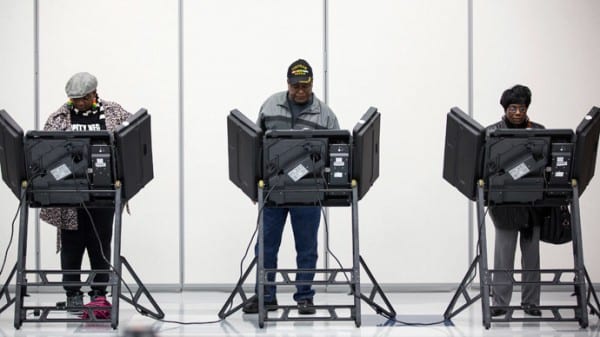‘Republicans and Democrats – two branches of the one party’
[dropcap]T[/dropcap]here will be no significant change in the US Congress after mid-term elections as the two predominant parties both serve the interests of big corporations and work together against the interests of the Americans, political analyst Eric Draitser told RT.
RT: How do you think the balance in Congress will shift after this election? Is it going to change anything?
Eric Draitser: Well, it depends on how we mean “anything.” Certainly, at some local level, even presumably in state level elections, you will see some changes, particularly with regard to various ballot initiatives, but certainly at the larger national level and of course international level there will be no significant change. The fact of the matter is that the two predominant parties in the US are really one party; they are merely two branches of the big business corporate party. This, I think, we can see quite clearly with a very recent example that was in the news just last week regarding the Food Bill and the supposed triumph by the democrats in the Food Bill, which they rejoiced over for the simple fact that they only cut nine billion dollars out of the Food Stamps budget while the Republicans wanted to cut 20 or more billion dollars out of the same budget. So as more and more Americans go to bed hungry and are homeless, and other various problems, you see that the two parties in fact work together to compromise against the interests of the American people.
RT: It hasn’t always been like that when the Congress seemed to be working with the President. Should we expect some major changes in the country’s policy if Republicans get control of both chambers?
ED: If we say that they are working with the President against the interests of the American people, than it is certainly true. You are correct in a sense there will be a growing antagonism between Republicans and Democrats, particularly as Obama becomes the pure lame duck President as he will be for the next two years. Certainly that’s a significant difference from the Congress that we have had up until this point. I would argue, and anybody who would like to make a counterargument I will certainly be interested, how it is significantly different when Democrats who are in control of Congress versus when Republicans are in control of Congress. The wars are still prosecuted, 80-plus billion dollars going to Afghanistan for fiscal year 2015; compare that to the massive budget shortfalls that were supposed to be paying out of pocket for education, healthcare and a variety of other areas. Really if you look at it there is a very little distinction between the two. If you want to make a historical argument – I suppose that’s possible – but again, the war party is dominant in Washington, the Wall Street party is dominant in Washington.
RT: Could the third parties, like the Libertarian Party and the Green Party, offer any alternative to voters? Where are their supporters, why don’t we hear them?
ED: Part of the reason for that is because the political system and the electoral system in the US is a controlled system – it is a metrics of control. Certainly the corporate media is part of that infrastructure of control. By shutting out the Green party, Socialists, Libertarians and various other third parties what they do, is they narrow the frame of the debate, they keep the Americans fighting over smaller issues, superficial issues, often cultural values issues in order to maintain their hegemony over America’s political system. Hegemony really is the word what the US does around the world using military and political power, it’s precisely what the political establishment does at home, that is dominate and control and shut out the opposition as much as it is possibly can.
The statements, views and opinions expressed in this column are solely those of the author and do not necessarily represent those of RT.
NOTICE: YOUR SUBSCRIPTIONS (SIGNUPS TO OUR PERIODICAL BULLETIN) ARE COMPLETELY FREE, ALWAYS. AND WE DO NOT SELL OR RENT OUR EMAIL ADDRESS DATABASES.


